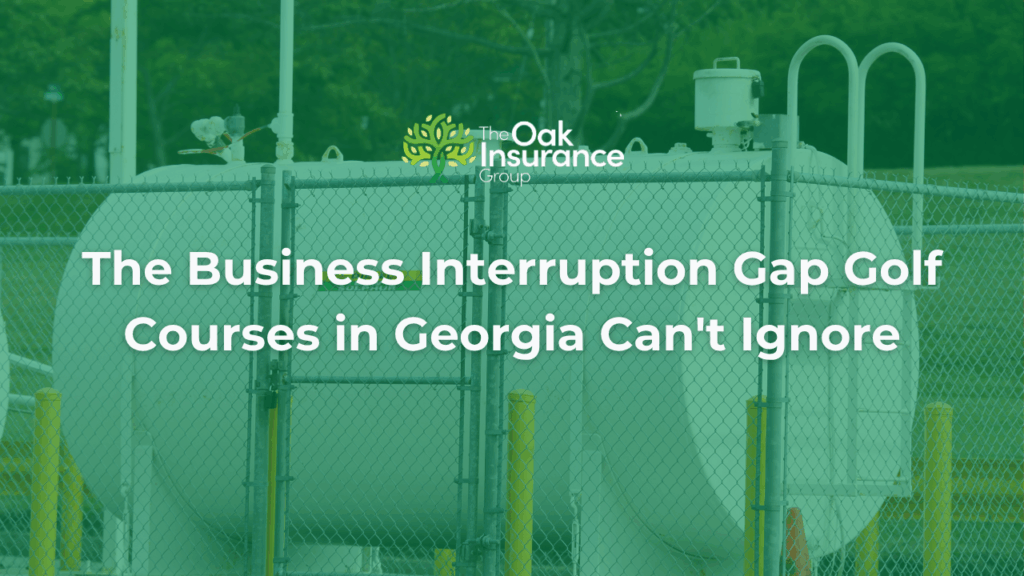
What would happen if a slow, hidden fuel leak on your course contaminated a local waterway—costing you hundreds of thousands in cleanup and liability?
Many golf course owners don’t realize that their on-site fuel storage tanks are ticking environmental time bombs.
In this article, you’ll learn why these tanks pose a serious risk to your operations and reputation—and how standard insurance likely won’t protect you if something goes wrong.
We’ll cover:
- The hidden dangers of on-site fuel storage
- Why traditional insurance falls short
- How specialized pollution coverage fills the gap
The Problem: Environmental Risks Lurking Beneath the Surface
Golf courses depend on a fleet of maintenance vehicles to keep greens, fairways, and landscaping in top shape. On-site fuel storage—often through above- or underground tanks—seems like a cost-effective and convenient solution.
But there’s a serious downside: fuel storage tanks can leak, releasing harmful substances into the soil and groundwater. These events are not just rare accidents—they’re well-documented and expensive disasters in waiting.
Two Key Threats Every Course Faces
1. On-site contamination:
Leaks from corrosion, overfills, or faulty seals can contaminate the property itself. Soil and groundwater pollution harm local ecosystems and create long-term environmental damage.
2. Off-site migration:
Contaminants can spread beyond your property, impacting neighboring lands and water sources. This opens the door to third-party lawsuits, property damage claims, and steep cleanup costs.
A real-world example: A single underground diesel pipe leak led to over $600,000 in remediation costs. In another case, a small leak contaminated a stream for more than five miles—triggering significant fines and damages.
The Expertise: How Government Oversight Makes This Even Riskier
If the environmental risks weren’t enough, there’s also regulatory compliance to worry about. The EPA mandates strict rules for underground storage tanks (USTs) that hold more than 1,100 gallons.
Violations—like failing to install leak detection systems or lacking proof of financial responsibility—can result in fines up to $10,000 per day, per violation. State-level penalties often add even more to the total.
If you’re not 100% confident in your current compliance status, you’re at risk.
The Path Forward: Why Standard Insurance Won’t Cover You
It’s a common—and dangerous—misconception that Commercial General Liability (CGL) policies will cover pollution-related incidents.
They won’t.
Most CGLs include an “absolute pollution exclusion,” which removes coverage for claims related to fuel leaks and environmental contamination. That means you’re on the hook for:
- Soil and water cleanup
- Legal defense costs
- Property damage to neighbors
- Medical claims due to toxic exposure
Without proper coverage, even a small leak can bankrupt a course.
The Protection: The Insurance That Actually Covers These Risks
To truly protect your course, you need specialized environmental insurance—specifically:
1. Storage Tank Pollution Liability Insurance
This policy is purpose-built for owners of above- or underground fuel tanks and covers:
- On- and off-site remediation
- Bodily injury and property damage claims
- Legal defense
- Corrective actions
2. Additional Coverage to Strengthen Your Risk Management Plan
- Premises Pollution Liability: Protects the entire property from chemical spills, leaks, and environmental damage.
- Transportation Pollution Liability: Covers fuel or chemical spills during delivery or waste removal.
These tailored policies fill the gaps left by traditional insurance and give golf course operators peace of mind.
Conclusion: Protect the Course—And Your Bottom Line
At the end of the day, you’ve likely invested in on-site fuel storage for good reasons: convenience, efficiency, and cost savings. But that solution carries hidden, high-stakes risks—especially when it comes to environmental contamination and legal exposure.
Now that you understand the dangers and the coverage gaps in standard insurance, it’s time to take action. Pollution Liability Insurance for storage tanks is the only way to ensure a fuel-related incident doesn’t become a financial catastrophe.
Protect your course, your fleet, and your future—before a small leak becomes your biggest liability.

